#social norms
Text
Fantasy Worldbuilding Questions (Society)
Society Worldbuilding Questions:
What is each society’s crowning achievement or proudest "claim to fame"?
What are each society’s greatest ills or challenges? (Do these differ depending on who you ask?)
Who garners the most respect in this society, and why?
Who is shown the least respect in this society, and why (what does it value)?
Where are hierarchies and power differences starkest between people in this world, and why?
Where are social norms and influences (such as laws) most stringently upheld in this world, and why (e.g., what roles do politics, ideology, religion, or competition for resources play)?
When did this society’s power structures emerge or change significantly, and why?
When did major societal beliefs or practices become entrenched? Are there any that have recently fallen away or started to disappear?
Why is living within this society challenging for your main characters?
Why does each character enjoy or appreciate this society, if anything?
❯ ❯ ❯ Read other writing masterposts in this series: Worldbuilding Questions for Deeper Settings
#writeblr#fiction writing#writing tips#writing advice#writing#novel writing#worldbuilding#writing research#fwq#society#social norms#greatest ills#now novel
624 notes
·
View notes
Text
7 Neurotypical Norms I will Never Understand…
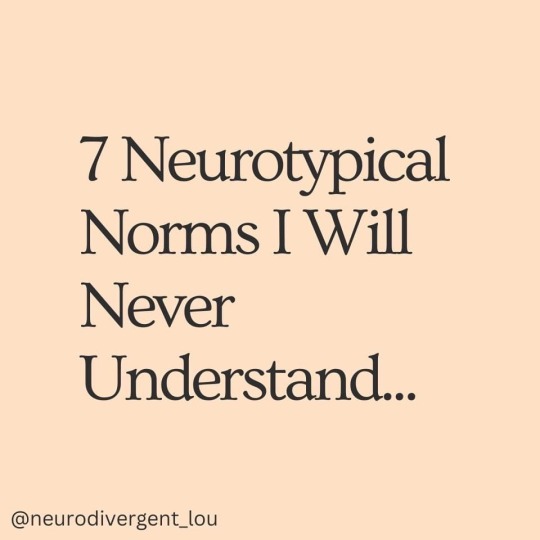
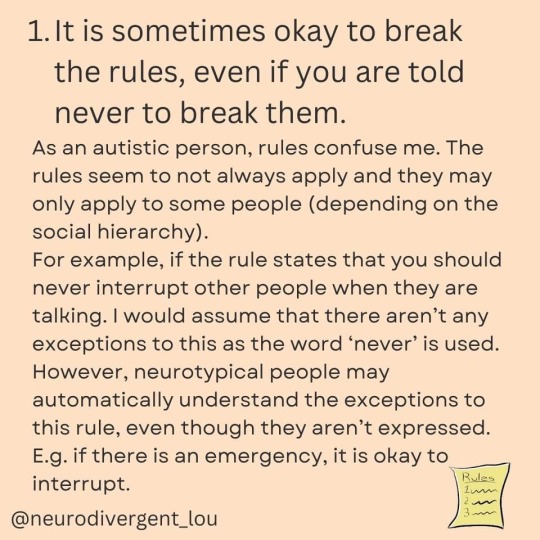
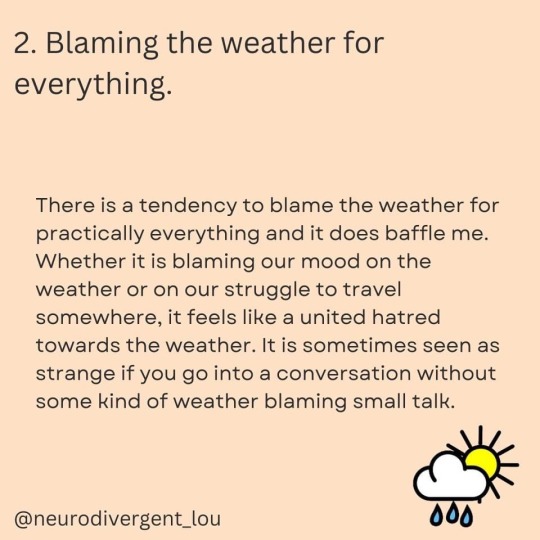
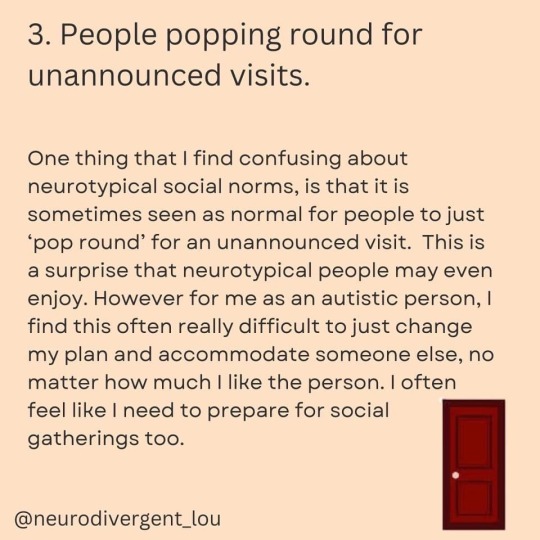

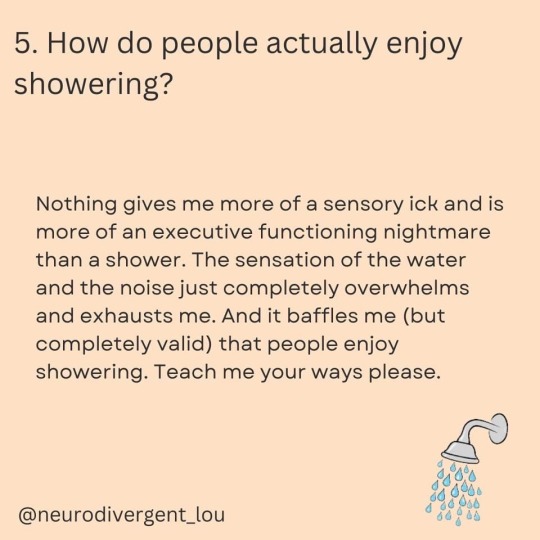

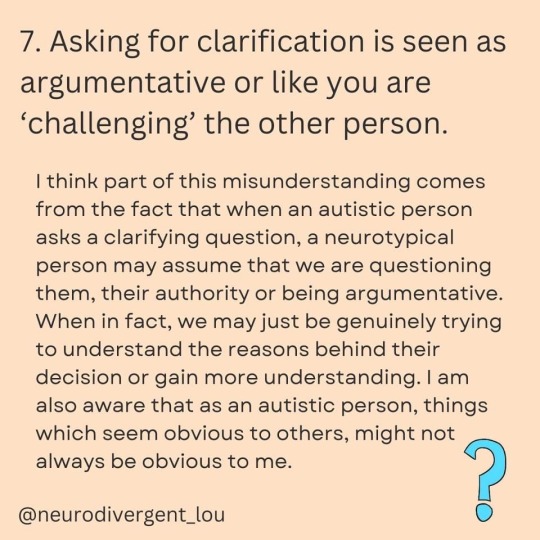
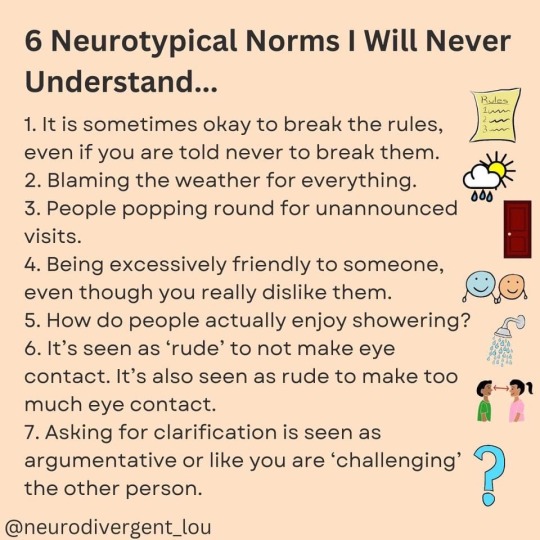
Neurodivergent_lou
#autism#actually autistic#social norms#social norms make no sense sometimes#neurodivergence#neurodiversity#actually neurodivergent#feel free to share/reblog#neurodivergent_lou (Facebook)
390 notes
·
View notes
Text
Just had the joy of introducing someone to the Geek Social Fallacies today--they're literally twenty years old and not the be-all and end-all of fandom social problems, but boy is this a thing worth reading if you never have.
279 notes
·
View notes
Note
What’s your view on toxic female friendships. I think it’s such a shame betrayal seems to be more common theme in female friendships. Men seem to have life long friends without any drama at all. Of course there are women out there with good life long friends but sadly it’s rare especially in this era we live in
xx
I think the underlying themes here are patriarchy and internalized misogyny. It can appear in blatant forms like women who sabotage each other for male attention, body/appearance/slut shame other women, or overly criticize other women's behavior and choices.
But I also believe there's a more covert patriarchal dynamic to women-women friendships vs. men-men friendships that's only recently become a prominent conversation in the public sphere/social media. As women, we're taught that it's our responsibility and culturally conditioned to perform all the emotional labor for the people in our lives – mainly men, but also other women. Men are taught and socialized with the opposite mentality.
So, I believe the dilemma comes down to this:
Female friendships exist as an outlet to unload our emotional stressors from all the men and women in our lives, so along with strict standards to be the "perfect" woman, it is easy for women to get on each other's nerves/bad side when we're all constantly emotionally exhausted and unloading onto each other. We overemphasize the emotional labor we should expect out of each other because we are conditioned to do this for the men in our lives. But, because other women aren't men, we start to resent/project onto them this anger. It's a very insidious type of internalized misogyny that I think a lot of women aren't aware of and therefore do not confront.
Then, there's the other side of the coin, where men don't really have these expectations of other men. Their friendship is based more on camaraderie through mutual interests, upbringing, lifestyles, or shared experiences (like working together, attending the same university, etc.). They don't uphold this expectation of performing emotional labor for themselves or each other. That role is reversed or the women in their lives.
Of course, I believe most men are so socially conditioned by patriarchy that they don't even realize this underlying dynamic and there are plenty of exceptions of emotionally intelligent men who desire to/actively unpack this to create more emotionally nourishing and equitable relationships in their lives, but I'm speaking in generalities for comprehension's sake.
Hope this resonates with some of you and answers your question. Bisous xx
#female friendship#male friendship#gender norms#gender roles#patriarchy#gender dynamics#women's empowerment#feminist#feminism#female socialization#male socialization#social norms#social commentary#gender performance#intersectional feminism#femmefatalevibe#q/a
128 notes
·
View notes
Text
It's often very hard to talk to someone about active feelings of severe discouragement about being able to achieve something, because of the way the other person will feel obligated to argue in an attempt to make me feel less pessimistic, and when I argue back (with what I view to be the relevant objective evidence) it just makes the other person feel visibly awkward. We're conditioned to want to encourage each other to keep trying and not to let someone feel hopeless. And, I guess the alternative -- that one should respond to such venting with "Yeah, you're pretty screwed, just give up man" -- doesn't seem great either. But sometimes people feel pretty screwed for a reason and might have to seriously consider that the most rational course of action is to just give up now rather than sink more cost into something that simply isn't going to pan out.
By the way, what I'm vagueing about here is the fact that my academic career seems (from my reading of the evidence) doomed after my current contract ends (by which time I'll be a decade out of my PhD). But my point applies (rather more loosely) to other things I'm failing at as well, or to endeavors that other people are failing at.
Meanwhile, someone who encounters me from an outside perspective and feels no obligation to a validating friend (an actual example being a woman I had a virtual date with back in the fall, who then canceled our developing plans for an in-person date when she found out about my career situation) may wonder, not unreasonably, why I continue year after year delaying my geographic/personal stability in order to stay on the academic job market on the offchance that my luck changes when almost all concrete evidence seems to point in the other direction. It actually looks pretty irrational from their perspective, and I don't quite know how to justify myself except to wave my arms in the direction of "everyone in my close personal and professional life tells me to keep trying and not to give up".
#failure#social norms#perpetual job hunting#academia#online dating#main evidence is i apply to ~70 tenure-track openings / year#and have never gotten a single on-campus interview ever
32 notes
·
View notes
Text
I’ve seen people moaning about how Starfield is sexless, and it makes me wonder how many Bethesda games they’ve seen that feature visual sex. Sex you don’t just hear or read about in-game.
Sex has never played a front-and-centre role in most Elder Scrolls or Fallout games, so I’m not sure what some were expecting from Starfield. Mass Effect levels of sexy time, I guess, which is in my view unreasonable in this context.
Sex is there in the lore of Bethesda games, but never shoved in your face. It’s more cerebral than that. They give you the suggestion, and then you roleplay the rest if that’s your thing. And that is a breath of fresh air. Considering the world we live in, that’s something to be celebrated.
True RPGs must be careful to be as inclusive as impossible. I have found many allosexual folks expect sex to be there, as it is in most media we are exposed to, and they don’t give one thought to those who would prefer to go about their day without sex being ever-present.
In Starfield, the first time I landed in Neon, I adored it. Why? Because it’s the antithesis of what you would expect from a ‘pleasure city’ in the sci-fi genre.
It was almost like they were saying, ‘Hey, remember the dancers in Mass Effect? Yeah, let’s take the piss out of that. Let’s make a club without sexy female dancers shoving their asses and titties in your face. Let’s put dancers of all genders and sizes on this podium, fully clothed in the silliest outfits, and make them dance like Shepard. Let’s make it feel like a child’s birthday party on drugs.
For the record, I’m allosexual, but that kind of satarical social commentary will always be funny to me.
Well done, Bethesda. Thank you for constantly pushing back on the ‘sex sells’ marketing mantra and just saying ‘no. If you want sex on your Starfield journey, imagine it. We haven’t ruled it out, but it’s up to the player how far they take it in their heads.’
That’s what a Role Playing Game should be. 👏🏼👏🏼👏🏼
#starfield#cosmic chats#bethesda#acespec#ace representation#allosexuality#social norms#challening social norms#game development#rpg#role playing games#thank you bethesda#supra et ultra
68 notes
·
View notes
Text

Adorkable Twilight & Friends - “Comparative Reasoning”
Adorkable Patreon Pals
Adorkable Twilight & Friends Twitter
Adorkable Twilight & Friends Wiki
Adorkable Twilight & Friends Deviant Art
#Comparative Reasoning#adorkable twilight#adorkable#adorkable twilight & friends#adorkable twilight and friends#comic#twilight sparkle#humor#cute#friendship#lawrence#poster#store#perfume#cologne#advertising#social norms#princess celestia#celestia#slice of life#dating
104 notes
·
View notes
Text
Pro tip: don’t call people with social anxiety/selective mutism/autism/nvld assholes or other names just because they can’t respond to waiters.
I don’t think you guys actually know what these conditions are. It’s not “using mental illness as an excuse”, many people with social anxiety and selective mutism are literally UNABLE to talk back. It’s not a choice. Many people with nvld and autism don’t do “normal social rules” BECAUSE THATS LITERALLY WHAT DEFINES THOSE DISORDERS
Mentally ill and neurodivergent people aren’t being rude. We’re not intentionally ignoring you.
And if you’re gonna pull the “if it’s so hard why are you out in public” bullshit, then don’t. We’re allowed to be in public. We’re allowed to challenge ourselves. And if we can’t do it? It’s not the end of the world.
Telling someone with social anxiety or selective mutism they shouldn’t be in public is quite literally the worst thing you can do. Every therapist I’ve ever had recommended the OPPOSITE. To go out MORE. That’s quite literally how people overcome it.
You guys are all “mental health matters” until it’s not mild anxiety or depression. Stop judging people who struggle in social situations. All it does is make it worse.
#social anxiety#social anxiety disorder#selective mutism#situational mutism#asd#nvld#social cues#social norms#etiquette#waiters#social rules#autism spectrum disorder#nonverbal learning disability#social issues#communication#mental health#mental illness stigma#sanism#ableism#anxiety#actually anxious#AVPD#avoidant personality disorder#actually socially anxious#actually mentally ill#have you considered that ppl can’t hear either?#I have severe hearing loss and was mistaken as rude for years for not responding to others#when I literally just couldn’t hear them#also if you have social anxiety and you don’t do this. good for you. everyone is different.#twitter
86 notes
·
View notes
Text
Turns out avoiding eyecontact while speaking only to stare intently at the other person as they speak while looking away is not "normal". My family is just made up of neurodivergent people
#eye contact#autistic things#autistic adult#autism awareness#actually autistic#autism#neurodivergent#neurodiversity#neurospicy#neurodiverse stuff#social norms#adhd
21 notes
·
View notes
Text
A Guide to “How Are You?”
So, I’m autistic, and of course, I can get slightly confused by certain social situations. But I’ve discovered that many others across the spectrum are confused by a very specific common greeting (at least, here in the US, where I live): “How are you?”
Other variations of this include “how ya doing” and “how have you been?”
This has confused many, and from what I’ve heard, it’s something that’s mostly in the States, so there’s also a cultural disconnect at times. Many have said that this question is dumb, since, if you answer honestly, it turns out that “other didn’t actually want to know” and “they only asked to make themselves feel good.”
However, as a neurodivergent person who has been studying many neurotypical social norms and cues for many years now, I believe that that is slightly untrue. Most neurotypicals who ask this question do care about having a relatively honest answer and are often curious about how others are doing, however, “how are you” is still a question that has some very simple “rules” to it.
In this post, I will be explaining the purpose of this question, and how to properly answer it in a way that others will find acceptable. It can be confusing at first, but once you understand the underlying intent behind it and know how to properly respond, it is very simple.
Intent Behind the Question:
A common reason people say this as a greeting is because they have essentially conditioned to say it. Everyone who uses this phrase has grown up hearing it all the time as a common greeting, similar to “hello,” thus creating a subconscious link between the phrase and saying “hello.” This has caused many to develop a knee jerk reaction to saying this where they greet someone. They are often saying by pure instinct rather than to be polite.
However, there is also a second reason many people say “how are you” as a greeting: they do legitimately want to know how you’re doing. “Now wait just a minute,” you may be saying, “it seems like everyone expects me to just say ‘fine’ as a response rather than how I’m actually feeling!” This is partially true, however, it’s a bit more complicated than that.
From what I can tell and based on my interactions with many neurotypical folks who ask this question as a greeting, they are perfectly okay with hearing how you actually feel, and don’t often mind it when it’s bad news. You don’t need to say that you’re fine, it’s just the easiest response.
What many don’t want to hear is all the details. The question is more meant to be a basic read on your current mood and how you’ve been in general lately, not everything that is currently happening in your life. They just want a short, simple answer with not to much context.
How to Answer:
The second part of this is a better explanation of exactly how one is supposed to answer the question in a way that is honest without overdoing it.
As I previously mentioned, the purpose of the question is to gauge how a person is feeling with a short, concise response. This means it’s good to answer honestly, but keep it brief. A good way to keep it brief is to explain how you’re doing in a single sentence.
Examples of this:
“I’m doing fine.”
“I feel great!”
“I’m kinda sad...”
Another thing that is typically an expectation and a way to keep it short is to not get all into exactly why you are feeling the way you’re feeling. The only reason it might be okay to get into it is if you haven’t see the person in a long time and are having a conversation with them or if they are someone close to you.
People may mostly care about how you are feeling, especially since that can affect how they should interact with you, but a lot of strangers don’t care quite enough to hear about your personal life and whatnot. It can admittedly feel like oversharing if you get a little far into it.
So, here are some samples for types of responses you can use to answer the question honestly:
(Feeling neutral or don’t want to talk about it) “I’m fine.”
(Happy about something) “I’m doing great!”
(In a bad mood) “I could be doing better/Things aren’t great right now.”
These are the most common types of answers and fit with a variety of things. They are short, brief, concise, and honest, but they also don’t explain to much about why someone is experiencing said emotions.
These are the most simple ways to answer the question. The main reason that “fine” is such a commonplace answer is because it’s very neutral. It’s not always that people don’t want to hear your honest answer, they’re just not expecting it. Most people don’t feel like sharing that much about how they’re feeling, so it can catch people off guard a bit.
But there are ways to answer honestly whilst simultaniously not putting people off, and that is by keeping it brief and straightforward without too much explanation.
Hopefully this was helpful to anyone who might need this.
~~~~
Anyways, that’s how to navigate the question “how are you?” I was gonna make this a one off thing, but I’m starting to consider making this a small series or something. Basically me as an autistic person explaining certain social ques and stuff based on what I’ve observed overtime. All the posts would take a very analytical viewpoint, as I didn’t learn some of these things in the same way neurotypical people did: I just overanalyzed stuff. So I have the advantage of both being able to communicate with my fellow neurodivergent folks in a way we all understand, and I also have a complex understanding of some of the social stuff.
So what do ya’ll think? Should I make this a little series? And if so, what should I cover?
#advice#autism#autistic#autistic spectrum#actually autistic#autistic community#autistic problems#autistic experiences#social ques#social norms#socializing#social situations#greetings#neurodiversity#neurodivergent#neuro divergent#actually autism#actually neurodivergent#neurodiversesquad#actually neurodiverse#neurodiverse stuff#neurodivergent community#neurodivergent culture#neurodivergencies#it's the autism#autism advice#neurotypical#people are weird
90 notes
·
View notes
Text
You forget what made
you happy in favor of
what kept you alive.
-- @drogonea
#haiku poetry#haiku poem#poems and poetry#poem#poetry#poems on tumblr#poetic#original poems#poem writing#poems and quotes#writing#haiku#daily haiku#poet#poems#society#social norms
42 notes
·
View notes
Text
Overused trope, but when a low-born boy falls in love with a high-born girl. He knows the parent(s) don’t approve of him courting their daughter, so he remains courteous and pines from a distance, never guessing she feels the same way.
He doesn’t have any prospects to offer her, but she doesn’t care. Maybe they confess their feelings, but go for a time pretending they didn’t because society wouldn’t let them be together. Maybe she chooses him over a socially acceptable suitor and/or arranged marriage. Maybe she’s even disowned.
And when they do court, higher society shames them. They accuse the boy of marrying her for money and status. They assume the girl is looking for a scandal. They are appalled the parent(s) would allow such a union. The boy feels insecure and the girl is abandoned by her “friends”.
And yet they are so in love that they learn to ignore what others say. They won’t let social norms get in the way of their happiness. And maybe it takes an epic adventure to get there.
#writers on tumblr#writeblr#writing#writerscommunity#prompts#writing prompt#social norms#period drama#pirates of the caribbean#willabeth#I’m literally thinking of willabeth#romance tropes#romantic tropes#writing romance#very specific trope#tropes#overused trope#but i like it#miscellaneous#why didn’t they ask Evans?#bbc the musketeers#tangled#anastasia
35 notes
·
View notes
Text
It’s funny how many people can get mad at you for “I don’t accept or respect arbitrary social norms” disorders. Like hey. Fuck ypu and fuck that. And especially fuck you for folks who want/expect me to not be fucking weird?? Idk if I have autism or not. I do know that I have aspd. But the fact remains that people treat both as “bad people disorder“ and it fucking shows.
What? I didn’t stroke off your ego? I didn’t publicly suck you off? Wow, shocking I didn’t get the promotion. Idiot world. I really hate neurotypicals.
14 notes
·
View notes
Text
Question: do neurotypicals really think that I’m trying to one-up or belittle them when I share interesting facts about animals or history? I share these things with people because I think they’re fascinating and cool and want to share them with people that I like. I love learning new things, and I always kind of assumed that others took my fact-sharing at face value rather than reading hidden intentions into it.
I’m asking this because a). I’ve seen some complaints about “pedantic nerds” lately, and b). it would explain some of the more negative reactions that I’ve gotten from people after sharing what I thought was just a neat animal fact or something.
43 notes
·
View notes
Note
is hookup culture a bad thing
Any expectations of women (or men/anyone of any gender) in an attempt to control their sexuality in some way is a bad thing for sure. I think it depends on what you mean by "hookup culture."
If you mean, is it bad that it is now acceptable for women to have casual sex with as many people as they desire with less shame? Then, no "hookup culture" aka sexual liberation is a great thing.
But if you mean "hookup culture" as in expecting, demanding, or depersonalizing sexual experiences (which also can lead to more bad sex than necessary), I would say hookup culture is a bad thing – not because it's casual but because it lacks humanity and feels like the other side of the same coin as purity culture.
No one should be shamed or limited with their sexual autonomy as long it's all consenting adults involved.
Hope this helps xx
#casual sex#sexuality#sex and relationships#dating and relationships#female sexuality#purity culture#interpersonal relationships#social norms#social commentary#femmefatalevibe#q/a
24 notes
·
View notes
Text
As I noted three years ago here in the particular context of, well, everything that was going on three years ago, one of my big issues with a lot of today's social culture -- most concentrated within progressive social culture, I think -- is the fact that it's completely taboo to question or disagree with anyone's personal fears or feelings of unsafety, while it's not at all taboo to express whatever personal fear you like at the risk of harmful fear-mongering. (I'm pretty sure this didn't used to be so much of a socially progressive thing: I remember looking down on the social culture around neoconservativism for exhibiting these norms around terrorism twenty years ago.)
I'm bringing this up again because throughout this past year, particularly near the end of the year, this has seemed to become more pronounced, and it's kind of driving me crazy. I'm not sure I feel comfortable going into concrete examples because some of them involve my colleagues (one of whom I happen to know even has some vague connections to the rationalist movement and might well stumble around these parts of Tumblr) who I generally like very much, but suffice it to say that the recent eruption of the Israel-Hamas war has contributed a lot to it (and it's seen on both sides of that, interestingly given that the pro-Israel side doesn't align with modern progressivism) and the ever-intensifying culture battle over transgender issues really isn't helping either.
#social norms#fear mongering#israel-hamas conflict#trans issues#venting#starting off 2024 on a spicy note
25 notes
·
View notes